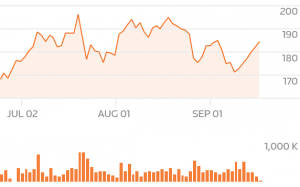HONG KONG (Reuters) – Tencent Music, which owns China’s most popular music streaming apps, is often compared to Sweden’s Spotify Technology (SPOT.N) but it offers more in the way of socially interactive services that is helping it hit bigger notes in money making.
The company, majority owned by Chinese tech powerhouse Tencent Holdings (0700.HK) and slated for a U.S. IPO next month, made almost $400 million in earnings before interest and taxes in 2017, according to an investor document circulated in August that was seen by Reuters.
Those profits are expected to nearly double to $764 million this year while revenue is seen climbing 72 percent to $3.1 billion, the document said.
By comparison, Spotify, with which it has a cross shareholding deal, lost 90 million euros ($105 million) in the second quarter of this year on revenue of 1.3 billion euros.
Tencent declined to comment on the earnings numbers for Tencent Music or the IPO plans. Reuters could not independently verify the figures.
In a market that until a few years ago was dominated by pirated music, Tencent Music’s strong financials are due to a business model that does not rely primarily on the monthly subscription payments that sustain Spotify and other Western music streaming companies.
Instead, analysts say much of its revenue comes from services such as karaoke live broadcasting where admirers tip performers.
“China music apps are more advanced in their integration of music streaming with live broadcasting, karaoke as well as social community,” said Elinor Leung, managing director of Asia telecom and internet research at CLSA.
“Social interaction is the main difference between Chinese music apps and Western music apps.”
Tencent Music also benefits from differences in music copyright payment in China and the West, according to BOCOM International analyst Connie Gu.
“Some popular musicians in Europe or the U.S. may require royalty payment per play count, while the current practice in China is for companies to sign three-year contracts regardless of play count, so the economy of scale helps the platform’s profit,” she said.
Tencent Music is seeking to raise $2 billion in its IPO, three people close to the deal told Reuters last week, in what will be one of the biggest U.S. listings by a Chinese company this year.
It made a confidential filing with U.S. Securities and Exchange Commission this month, the sources said and likely valuations for Tencent Music were not immediately clear. Spotify, which went public in April, is now worth more than $30 billion.
Tencent Holdings and Spotify announced a share swap in December that gave the Chinese company a 7.5 percent stake in Spotify including shares held by Tencent Music. Spotify held 9 percent of Tencent Music, according to the Swedish firm’s IPO prospectus.
BIG TIPS, BIG BUCKS
For Tencent Music, there’s much money to be made from people like Zhou Nan who performs on WeSing – a karaoke app that has some 50 million daily active users.
Zhou, 22, a music student in the city of Nanjing, conducts live performances on WeSing several times a month, with her band Flanger’s account boasting nearly 270,000 followers.
Tipping from fans gives her 30,000 yuan to 50,000 yuan ($4,400-$7,300) a month, she said, and that’s even after Tencent Music takes 70 percent according to their revenue-sharing contract.
“The biggest tip I received from a single performance once was 20,000 yuan,” Zhou said, adding that while she had a wide fan base, most tips came from those aged 40 or above.
Ordinary users of WeSing can also receive virtual gifts, with the purchase money all going to Tencent Music.
Tencent Music is also seeking revenue offline by selling goods such as microphones and headphones, and opening mini karaoke boxes that can be put in shopping malls. WeSing outlined plans to open 300 such karaoke boxes across China this year, local media reports have said.
All told, Tencent Music has more than 600 million active monthly users and about 80 percent of the online music market, according to the investor document. That includes its QQ Music streaming platform as well as the apps Kuwo and Kugou which it acquired in 2016.
Customers can buy songs or albums on Tencent’s apps, or sign up for monthly subscriptions that cost between 8 yuan to 18 yuan, compared with $9.99 at Spotify.
Those low fees and a relatively small proportion of monthly subscribers for those services could ultimately be a weakness, said Gu.
“Compared with video, payment for music is going to grow at a slower pace,” she said, adding that Tencent will need to work hard to convert more users into paying customers.
Tencent Music declined to comment on its ratio of paying customers.
It owns the most music copyright in China with some 17 million songs, though it shares or sublicenses content with rival apps owned by NetEase Inc (NTES.O) and Alibaba (BABA.N), so those users have access to similarly large libraries.
Reporting by Sijia Jiang | Editing by Jonathan Weber and Edwina Gibbs
[Thank you to Alex Teitz, http://www.femmusic.com, for contributing this article.]

